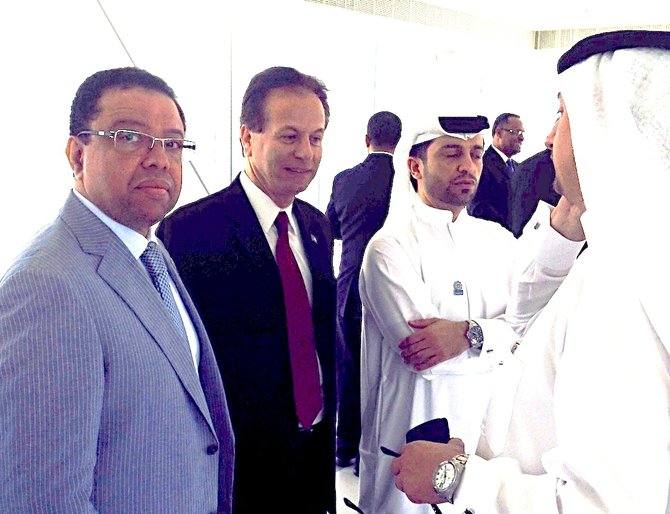By NEIL HARTNELL
Tribune Business Editor
nhartnell@tribunemedia.net
A Bahamas-based businessman yesterday said he was aiming to organise a private sector-led Trade Mission to Dubai by January 2014, in a bid to exploit both the Government’s recent visit and capital markets/construction opportunities.
Tony Joudi, head of FTC Construction, who accompanied government ministers on their recent visit to the Middle East nation, told Tribune Business the Bahamas had to move quickly to capitalise on the goodwill and contacts created by the Christie administration.
Disclosing that he was in the process of alerting the Bahamas Chamber of Commerce and Employers Confederation (BCCEC) and Bahamas International Securities Exchange (BISX) to the potential opportunities, Mr Joudi said he would use “the next few weeks” to organise a private sector visit to Dubai.
“The next step for us is to take a business delegation back there to meet with these people that I’ve met with already, and start the process,” he told Tribune Business.
“I will be targeting the third or fourth week of January to go back there with a mission organised by businesspeople and entrepreneurs.
“I am hoping to meet with the Chamber of Commerce, as well as the Contractors Association and the chief executive of BISX in order to let them know how important it is for us not to be isolated, to open up and be welcoming.”
Mr Joudi, who has family members living in Dubai, as they come from the Middle East, said he was able to meet with senior executives at Dubai Financial Market, the stock exchange, including Maryam Mohd Fekri, its chief operations officer, during the Government’s visit.
Other meetings included encounters with the Dubai Chamber of Commerce, and Abdullah Aziz, the number two executive on the Middle east nation’s Metro Rail Authority.
Mr Joudi told Tribune Business that there was an opportunity for Bahamas-domiciled investment funds, particularly those listed on BISX, to have dual or cross listings on the Dubai stock exchange.
This, he explained, would give Bahamian investment funds access to a much deeper pool of investment capital. By selling shares in Dubai, these funds would “create access to cash” that could be shifted to the Bahamas for investment in financial real estate or even agriculture projects.
Backing the “boldness and courage” of the Government in seeking out new markets and investment capital sources, Mr Joudi said this was essential if the economy was to grow.
“We have been stagnant since the recession hit in 2008,” he added, “and we have a new government with new vision and commitments to the public to create jobs.
“By sitting here and waiting for things to happen, that will not cut it any more. If we are not seen, if we are not visible, we will be forgotten, and we should not be scared of bringing people here.”
With Dubai gearing up for further massive multi-billion dollar construction projects, Mr Joudi said the executives he met with had encouraged Bahamian contractors to bid on this via joint ventures with local entrepreneurs.
And he called on the Bahamas to capitalise on the $409.5 million in Lynden Pindling International Airport (LPIA) by encouraging Etihad Airways and Emirates Airlines to fly to Nassau, and establish a Western Hemisphere “hub” at LPIA.
“If we can convince Dubai, Etihad and Emirates, to use Nassau as a hub, then do we know the amount of people who will come through here?” Mr Joudi asked.
With Dubai a leading candidate to host the 2020 World Expo, he added that an LPIA hub could be used to route Western Hemisphere traffic to and from Dubai.
Noting that this would tie-in to efforts by the Nassau Airport Development Company (NAD) and the hotel industry to boost annual airlift by 400,000 seats in readiness for Baha Mar’s opening, Mr Joudi said Dubai could also provide a gateway to attracting Middle Eastern visitors to the Bahamas.
Apart from the increased fees generated by aircraft and passenger traffic, which would cover LPIA’s expansion costs, Mr Joudi said: “A lot of Saudis, Arabs are going to Dubai.
“They need change; they can’t go there year after year. If we can offer them direct flights, these guys have got money to spend and will stay here for two-three weeks. That will fill up the hotel alone.”
Current turmoil and political unrest throughout the Middle East meant that many wealthy Arabs had shifted their finances to Dubai, creating an “overflow of capital”.
The Bahamas, Mr Joudi said, was a prime investment destination for this surplus capital, but much depended on how this nation pursued the opportunity.
“It depends on us,” he told Tribune Business. “It depends on how we pursue it, how we promote it, how serious we are.
“We could benefit from that overflow, and that overflow is in the billions of dollars if we apply ourselves properly and correctly.”
Mr Joudi added: “We have to offer something. If it is not something that is safe, lucrative and convincing, they will not come.
“It’s all about marketing. Sun, sand and sea, that’s no more. Everybody has it. Now we have to market ourselves, our products and services. If we don’t do that, the train will pass us like crazy and we will be left behind.
“The days are gone when we could sit at a desk, and people would come and say: ‘It’s a million dollar project, go do it for me’.”
Mr Joudi also urged the Bahamas to learn from Dubai’s “spirit of excellence and competitiveness”, and the Middle East nation’s desire to accomplish things and intolerance of mediocrity.





Comments
Ocaba 12 years, 3 months ago
Who paid for his trip?
Sign in to comment
OpenID